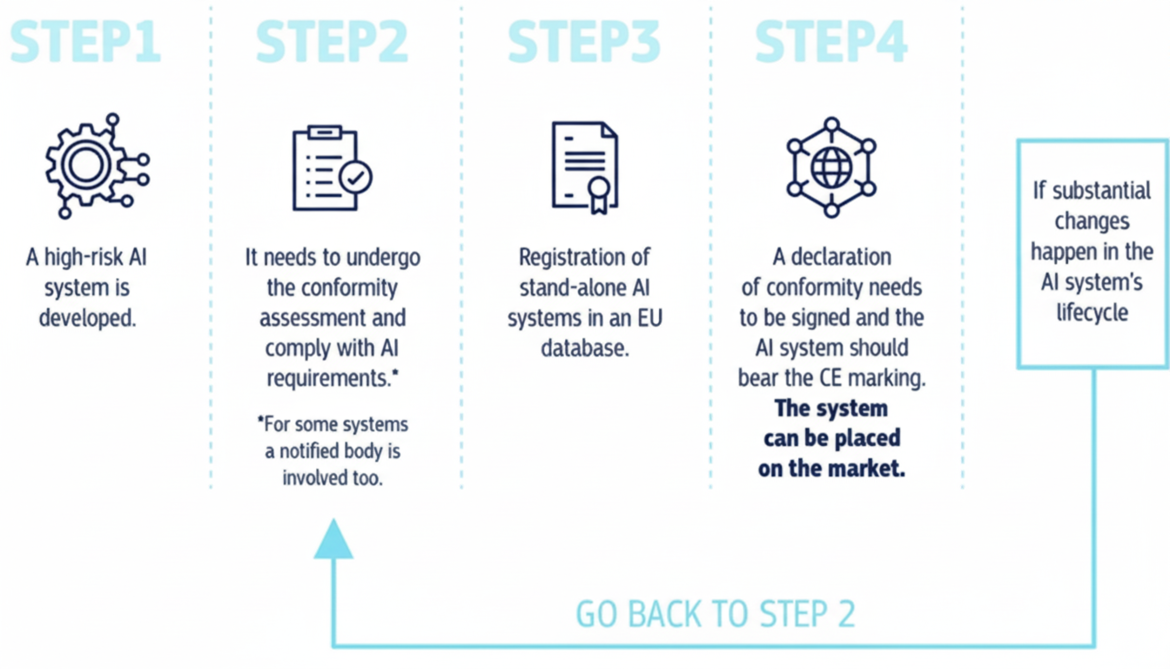The SME Compliance Paradox: Why German Small Businesses Excel at GDPR but Struggle with AI Rules
German SMEs excel at GDPR but struggle to meet new AI compliance demands. Thomas Amberg of Ynvolve explores how this gap could reshape their digital competitiveness.

© IR_Stone | istockphoto.com
We recently came across an interesting study by researchers Thomas Joswig and Walter Kurz that reveals a striking contradiction in how German small and medium-sized enterprises (SMEs) navigate Europe’s evolving regulatory environment. While these companies demonstrate impressive mastery of data protection laws, they face significant blind spots in AI compliance, a gap that could determine their long-term survival in the digital economy. Let’s explore what the data reveals about sector disparities, enforcement realities, and the practical support SMEs need to turn compliance from a roadblock into a sustainable long-term strategy.
The numbers tell the story
The research, published in the Journal of Next-Generation Research 5.0, surveyed SMEs across key industries and uncovered a remarkable disparity: German small businesses score an impressive 82.24/100 for GDPR familiarity, yet manage only 56.24/100 for AI Act awareness. This 26-point gap signals a potential compliance crisis that could cost companies millions in penalties when full AI Act enforcement begins in August 2026.
Understanding the AI Act: Europe’s new digital rulebook
High-risk applications (for example, AI used in healthcare diagnostics, financial credit scoring, and employment decisions) face stringent requirements for transparency, human oversight, and technical documentation. The regulation mandates that companies deploying these systems maintain detailed records, conduct regular audits, and ensure their AI decisions can be explained to affected individuals. With penalties reaching €35 million or 7% of global annual turnover, the stakes are considerably higher than many SMEs realize.

Source : AI Act | Shaping Europe’s digital future
Sectoral divide: healthcare and government hit hardest
The study reveals dramatic variations across industries, with healthcare and government sectors reporting the heaviest regulatory burdens. These data-intensive sectors face a perfect storm: complex patient privacy requirements under the GDPR combined with stringent AI transparency obligations for high-risk applications like diagnostic systems. Meanwhile, the energy and finance sectors show surprisingly lower preparedness levels despite their increasing reliance on AI-driven operations.
Healthcare SMEs particularly struggle to implement explainability requirements for AI-assisted diagnostics while maintaining patient data protection, a challenge that requires substantial investment in compliance infrastructure, including specialized documentation systems and risk assessment protocols.
The resource reality check
Unlike multinational corporations with dedicated compliance teams, SMEs must balance regulatory adherence with operational survival. The study found that compliance-related costs disproportionately affect smaller organizations, with initial setup costs for AI Act quality management systems estimated at €193,000–330,000, plus €71,400 annually to maintain. For companies operating on thin margins, these figures represent existential threats rather than mere operational expenses.
This resource constraint creates a vicious cycle: SMEs delay AI adoption due to compliance uncertainty, falling further behind competitors who successfully navigate the regulatory maze. According to a survey by Deloitte, 52% of German businesses worry that AI Act requirements will limit their innovation opportunities, while only 36% feel prepared for implementation.
The Germany-specific challenge: fragmented enforcement
A particularly concerning finding concerns Germany’s decentralized data protection structure. Unlike France’s centralized CNIL approach, Germany’s 16 federal states apply GDPR provisions with varying interpretations and enforcement strategies. This fragmentation creates additional compliance burdens for SMEs operating across regional boundaries, forcing them to navigate multiple regulatory interpretations simultaneously.
The study documents how cross-border SMEs face increased legal costs and procedural complexity when dealing with different state-level data protection authorities, each applying GDPR provisions according to their own understanding. This regulatory patchwork, unfortunately, undermines the EU’s goal of harmonized digital market conditions.
Beyond compliance: the innovation dilemma
Perhaps most concerning is the study’s finding that explainability and transparency obligations, while essential for building trust, introduce administrative burdens that may actually impede innovation. SMEs report struggling to balance the dual demands of regulatory compliance and competitive necessity, often delaying AI implementation rather than risking non-compliance penalties.
This hesitation comes at a critical moment when AI adoption could provide competitive advantages. Research shows that compliance-by-design approaches can actually save companies $3.05 million per data breach, yet many SMEs lack the upfront resources to implement these protective measures.
The path forward: sandboxes and support
The researchers propose several targeted interventions to address these challenges. Regulatory sandboxes emerge as particularly promising solutions, providing controlled environments where SMEs can test AI systems without immediate enforcement penalties. Evidence from the UK’s Financial Conduct Authority sandbox shows participating firms achieve 15% higher capital-raising success and 50% better funding probabilities.
The study also emphasizes the critical need for simplified guidelines, sector-specific frameworks, and financial assistance programs. These support mechanisms could help SMEs implement necessary compliance measures without diverting critical resources from core operations.
From AI to ESG compliance
Beyond AI governance, regulatory and investor scrutiny is shifting toward demonstrable ESG performance, making sustainability compliance a board‑level obligation for German enterprises as circularity becomes a national priority.
Adopting circular IT (refurbishing, reusing, and extending the life of servers and endpoints with full traceability) supports Germany’s National Circular Economy Strategy while strengthening evidence for sustainability audits and disclosures.
Digital product passports and chain‑of‑custody records across the hardware lifecycle turn environmental claims into verifiable data points that withstand assurance, improving transparency from procurement to decommissioning.
Practically, circular models reduce material and energy demand, cut lifecycle emissions and costs dramatically (up to 80% cheaper according to our calculations), and increase supply‑chain resilience, benefits that all translate into credible metrics for ESG ratings and investor due diligence.
Conclusion
German SMEs are at a pivotal moment: EU AI Act transparency and GDPR diligence now need to land alongside credible ESG progress, or they risk falling behind competitors that operationalize all three.
The study’s message is clear: turn compliance into strategy by unifying explainability, data protection, and sustainability into a single operating model that speeds delivery, not slows it.
Circular IT accelerates this shift: traceable, refurbished infrastructure and chain‑of‑custody records make AI documentation tangible while advancing Germany’s circular economy priorities.
Momentum starts small and compounds quickly. Map AI use cases and data flows, link them to Article 13 transparency duties, baseline GDPR controls, and plug gaps by maintaining a living, cross‑functional compliance record. Pair that with circular hardware standards and sovereign hosting choices, and the result is an explainable, sustainable AI stack that satisfies regulators, auditors, and sustainability reviewers without slowing innovation.
Ready to make compliance a competitive advantage? Schedule a call with our team of experts to see how we can help your company navigate the regulatory complexities while staying budget-conscious.
📚 Citation:
Amberg, Thomas. (November 2025). The SME Compliance Paradox: Why German Small Businesses Excel at GDPR but Struggle With AI Rules. dotmagazine. https://www.dotmagazine.online/issues/ai-automation/german-smes-ai-compliance
Born and raised in southern Germany, Thomas Amberg is a European at heart. He combines an international mindset with his practical and dynamic approach to life. Studying and living abroad in the Netherlands and Denmark taught him to be adaptable and culturally aware. Now responsible for the development of DACH markets, he is also a passionate handball player.
FAQ
What are the main legal obligations for German SMEs when deploying AI systems?
• SMEs must follow the EU AI Act (once in force) and GDPR
• This includes ensuring transparency, documentation, and lawful data use
• AI systems must meet accountability and governance expectations
How can SMEs manage the challenge of data governance and quality for AI use?
• Define roles for data access and control
• Set up quality and integrity checks
• Document processing and secure a lawful data basis
What practical steps can SMEs take to build “trustworthy” and compliant AI?
• Use privacy-by-design and anonymisation where possible
• Conduct risk assessments (e.g., DPIAs)
• Train staff and define oversight roles
What issues of liability and transparency should SMEs be aware of?
• Legal responsibility stays with the human operator
• Automated decisions must be explainable and auditable
• Poor transparency increases legal and reputational risks
How does regulatory uncertainty affect SMEs, and what can they do to prepare?
• Monitor evolving EU rules like the AI Act
• Build flexible policies that can adapt
• Seek support from initiatives like eco’s “AI in Practice”
How can SMEs balance innovation (AI deployment) with compliance and operational risk?
• Start with scoped pilot projects
• Use modular, auditable AI deployments
• Treat compliance as a trust-building tool
Where can German SMEs find support and resources to implement compliant AI?
• Visit eco’s AI in Practice for tools and guidance
• Join industry networks and working groups
• Use training programs to stay informed on AI governance
Please note: The opinions expressed in articles published by dotmagazine are those of the respective authors and do not necessarily reflect the views of the publisher, eco – Association of the Internet Industry.





